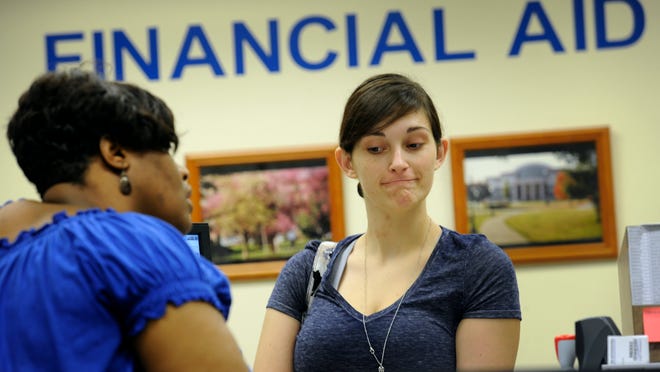Pre-pandemic financial aid packages inadequate for college students | Opinion
A standardized process is needed so packages can be updated quickly to reflect changes in students’ economic circumstances since they applied for aid.
Jodie Adams KirshnerGuest columnist
- Jodie Adams Kirshner, a bankruptcy scholar, is a research professor at New York University’s Marron Institute of Urban Management. Her latest book is “Broke: Hardship and Resilience in a City of Broken Promises.” She grew up in Nashville, returned in March because of the pandemic and has been living and conducting research with students there since then.
Whether they attend in person or online, aspiring college students still have to pay tuition, but their financial aid packages are based on their families’ tax returns from two years ago. Those may now be vastly out of sync with their current circumstances, especially for students whose family members held the types of jobs hit hardest by the COVID-19 pandemic.
Consider Sara, a student who graduated from a Nashville college preparatory charter high school in May. Her father worked at a local hotel and she took a part-time job at a restaurant to save up spending money for college. She enrolled at the University of Tennessee at Knoxville to study architecture.
In 2018 her and her father’s combined family income amounted to $51,000. That put her just outside the cutoff for the new UT Promise program launching this fall, which offers free UT tuition to students from families with household incomes under $50,000 a year, so she took out loans to finance the difference between the tuition and the financial aid available to her. Then coronavirus arrived and she and her father lost their jobs. However, her financial aid package did not automatically update from 2018 to reflect the family’s changed situation.
Students, their families have lost their jobs
Sara and her father are hardly alone: Roughly 50 million people have filed for first-time unemployment benefits since the pandemic began, and college students and the parents of those students make up a portion of them. Yet to seek an adjustment to financial aid, students face a difficult appeals process that the Department of Education has taken steps to make harder, and the economic fallout from the virus threatens to disrupt the trajectories of financially vulnerable students, or in some cases cause students to skip college altogether.
In 2009, confronting the ramifications of the financial crisis of that period, the Department of Education under then-President Barack Obama drafted new financial aid guidance. The new guidance enabled colleges to quickly review and reconsider financial aid offers based on families’ shifting financial conditions and reassured colleges that the review process would not trigger investigations into how the institutions were using financial aid funds, as high numbers of financial aid adjustments ordinarily would. In fact, the new guidance encouraged college financial aid officers to reach out proactively to students with help.

On a telephone call in late May, however, a Department of Education official suggested that because the coronavirus disrupted employment in a more “temporary” way than the 2008 financial crisis, the guidance developed by the Obama administration would be discontinued. In July, the Department somewhat reversed course and agreed to extend the safe harbor allowing colleges to conduct financial aid reviews without triggering investigations.https://tpc.googlesyndication.com/safeframe/1-0-37/html/container.html
But students like Sara still face difficult climbs. They must appeal to their colleges for idiosyncratic determinations of whether their families’ current experiences warrant more generous financial aid packages, which can be a slow process. To appeal, the students must clearly describe a major life event such as a job loss, salary reduction or unexpected medical cost and provide documentation to corroborate their statements.

Under Department of Education guidance, financial aid officers will use their “professional judgment” to review the effects of the virus on students’ financial status. The process varies by institution and by case, and students must reach out to colleges individually. For their part, colleges have no obligation to offer affected students more financial aid.
The colleges, meanwhile, are bracing for a deluge of student appeals. Sara has filed documentation with UT. Now, more than a month after the semester began she is still waiting for a decision from the financial aid office. She has moved into her dorm room and started her fall classes, but, absent a successful determination, she may not be able to afford to attend after all.https://www.usatodaynetworkservice.com/tangstatic/html/pnas/sf-q1a2z3be0d353f.min.html
Evaluations made two years ago are meaningless
Sara’s in this mess because, even before coronavirus, any hope for obtaining financial aid that truly reflects what students and their families can afford at the time that matters most – the start of college rather than two years before – entails convoluted and haphazard appeals processes that are impossible to predict. The current crisis should finally afford recognition that families living on the edge, vulnerable to economic currents, frequently encounter setbacks and job losses that render economic evaluations from two years earlier mostly meaningless.
A standardized process for updating financial aid packages would enable more students to realize their college plans and ascend the primary rungs on a ladder to more stable financial futures.
Jodie Adams Kirshner, a bankruptcy scholar, is a research professor at New York University’s Marron Institute of Urban Management. Her latest book is “Broke: Hardship and Resilience in a City of Broken Promises.” She grew up in Nashville, returned in March because of the pandemic and has been living and conducting research with students there since then.
